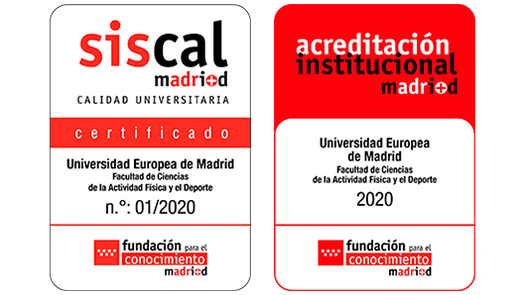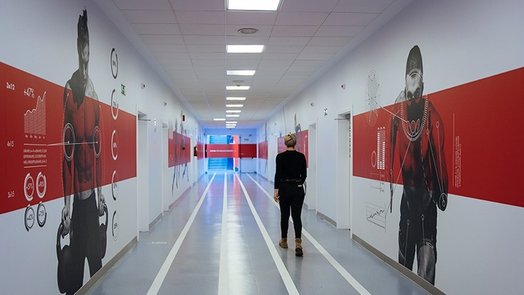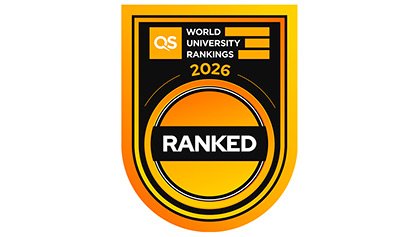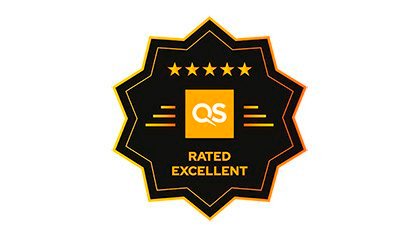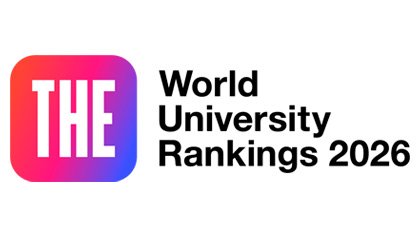-50% Discount on place reservation for 26/27 intake until February 28th!
Study Sport Management, a degree that combines sport science and business skills.
The Sports Management Degree is aimed at students who want to establish a career as a leader in the sports sector, working within sports companies, organisations, governing bodies and clubs, making sure the sector evolves in the 21st century. The four-year Global Sports Management Degree, consisting of 240 ECTS, includes subjects such as managerial skills for the sports business, sports law, economics and accounting, ensuring you will have a broad range of skills and knowledge when you graduate.
As a student of this programme, you will spend your fourth year in a top university in the United States, where you will finish your studies and undertake an internship, allowing you to gain a true international vision and make connections across the globe.
Official degree issued by Universidad Europea de Madrid
| Campus-based | Villaviciosa de Odón | 4 years, 240 ECTS | Start: 14 sep. 2026 | Faculty of Medicine, Health and Sport |
Turn your passion into your profession
Testimonials
Study plan
A curriculum designed from the needs of the job market. You receive comprehensive training in which we are pioneers and in which the development of sports practice and physical activity coexist with training in the management of sports facilities and their characteristics: fitness centres, golf courses and major sporting events. Learn all about the technical aspects of the industry and the skills you need to become a great director or manager. During the first years of the degree, you will acquire more general knowledge and then, guided by your professors, you will discover in which area you would like to develop professionally.
Study plan structure
| Materia | ECTS | Tipo | Idioma de impartición |
|---|---|---|---|
| Theory and History of Contemporary Sport | 6 | Básica | Inglés (en) |
| Sociology and Deontology of Sports | 6 | Básica | Inglés (en) |
| Corporate Communication Skills | 6 | Básica | Inglés (en) |
| Business Fundamentals | 6 | Básica | Inglés (en) |
| Consumer Behaviour | 6 | Básica | Inglés (en) |
| Financial Accounting I | 6 | Obligatoria | Inglés (en) |
| Financial Accounting II | 6 | Obligatoria | Inglés (en) |
| Analysis of Economic-Sports Environments | 6 | Obligatoria | Inglés (en) |
| Basic Foundations of Sports Teams | 6 | Obligatoria | Inglés (en) |
| Basic Foundations of Aquatic Activities | 6 | Obligatoria | Inglés (en) |
Second year
| Materia | ECTS | Tipo | Idioma de impartición |
|---|---|---|---|
| Sports Law | 6 | Básica | Inglés (en) |
| Managerial Skills for the Sports Business | 6 | Básica | Inglés (en) |
| Design and Planning of Sports Areas | 6 | Obligatoria | Inglés (en) |
| Statistics | 6 | Básica | Inglés (en) |
| Analysis of Financial Operations | 6 | Básica | Inglés (en) |
| Sport Industry | 6 | Obligatoria | Inglés (en) |
| Modern Language | 6 | Básica | Inglés (en) |
| Cost Accounting | 6 | Obligatoria | Inglés (en) |
| Basic Foundations of Individual Sports | 6 | Obligatoria | Inglés (en) |
| Basic Foundations of Outdoor Activities | 6 | Obligatoria | Inglés (en) |
Third year
| Materia | ECTS | Tipo | Idioma de impartición |
|---|---|---|---|
| Human Resources Management | 6 | Obligatoria | Inglés (en) |
| Sports Policy | 6 | Obligatoria | Inglés (en) |
| Management of Aquatic Facilities | 6 | Obligatoria | Inglés (en) |
| Analysis of Accounting Statements | 6 | Obligatoria | Inglés (en) |
| Golf Course Management | 6 | Obligatoria | Inglés (en) |
| Taxation | 6 | Obligatoria | Inglés (en) |
| Fitness and Wellness | 6 | Obligatoria | Inglés (en) |
| Technical Management of Sports Organisations | 6 | Obligatoria | Inglés (en) |
| Business Law | 6 | Obligatoria | Inglés (en) |
| Practicum | 6 | Optativa | Inglés (en) |
| University Activities | 6 | Optativa | Inglés (en) |
Fourth year
| Materia | ECTS | Tipo | Idioma de impartición |
|---|---|---|---|
| Internship | 12 | Obligatoria | Inglés (en) |
| Final Thesis Project | 6 | Obligatoria | Inglés (en) |
| Sales Management and Techniques | 4 | Obligatoria | Inglés (en) |
| Corporate Finance | 4 | Obligatoria | Inglés (en) |
| SME Accounting | 4 | Obligatoria | Inglés (en) |
| Quality Control and Customer Service in the Field of Sports | 6 | Obligatoria | Inglés (en) |
| Strategic Management | 6 | Obligatoria | Inglés (en) |
| Commercialization and Marketing for Sport and Leisure | 6 | Obligatoria | Inglés (en) |
| Management of Major Events and Sports Venues | 6 | Obligatoria | Inglés (en) |
| Leisure and Non-Conventional Venue Management | 6 | Obligatoria | Inglés (en) |
Timetable for the implementation of the degree
2021/2022
New vacancies
150 places
Internships and practical training
Internships are a key element in your training. Gaining experience after your degree is the best way to enter the job market. There are two types of internships: curricular (included in your curriculum) and extracurricular (which you can do on a voluntary basis).
In order to do an internship in a company, you will need to have passed 50% of the credits and enrol in the course before starting your internship. These internships are monitored by the company and the internship professor and also involve interim and final reports for assessment.
If you would like to improve your work experience before finishing your university studies, you can do an internship. You can do them in any academic year, but we remind you that internships are a training complement to your studies; therefore, the more knowledge you have acquired throughout your degree, the more you will benefit from the internship experience.
Our partners
Undertake your internship in relevant institutions such as the Spanish Olympic Committee, the Spanish Sports Council, Mutua Madrid Open, KMPG, Spanish Tennis Federation, Holmes Place, Sanitas or the AFE (Spanish Footballers' Association).
We have agreements with football clubs, large fitness chains such as Go Fit, sporting events, active tourism companies, public administrations and FAGDE. You are also connected to the industry as a member of the Círculo de Gestores Deportivos de Madrid (Madrid Sports Managers Circle).

Programme mobility offer
We have agreements with many universities in different continents so that you can choose the one that best suits your training. By clicking on this link you will access the “Map of destinations” of the University. Once there, you must click on “Search” and once in the search engine, you must filter your degree in “Program”.
Employability
- The employability rate at 15 months for students at the Universidad Europea is 91%.
- 86% of our students find work less than six months after finishing their studies.
- 84% of employed graduates work in the sector matching their area of studies.
Career oportunities
An increasingly internationally recognised industry. Sport Management generates $700 billion a year worldwide, 1% of the world's GDP, offering huge employment opportunities in both Europe and the USA.
Graduate profiles
With this Degree, you will acquire a differentiating professional profile as a sports manager and you’ll be able to develop your professional career in the following areas:
- Professional clubs, sports federations and companies dedicated to the organisation of sporting events.
- Sports services companies, sports equipment and in the management of sports and tourism-sports projects.
- Management and operation of sports facilities and services in public administration, golf clubs and aquatic centres.
In addition, they may be public and/or private education professionals. The professional fields of these graduates will be:
- Sports technicians.
- Director of sports clubs or companies.
- Director, coordinator, and promoter of sports events.
- Manager of sports facilities and entities.
- Manager of tourism, sports campuses...
- Sports advisor and consultant.
Admissions
Start your future at Universidad Europea
You can become a student at Universidad Europea in three easy steps.
1
Admission exams
Start your admission process by calling +34 918257503 or request information and our advisors will contact you.
2
Place reservation
Once you have been admitted, secure your place by paying the reservation fee.
3
Enrollment
Submit the required documents to formalise your enrollment.
Scholarships and financial aid
We want to help you. If you want to study at Universidad Europea, you will have at your disposal a wide selection of own and official scholarships.
Credit recognition and transfers
You don’t have to stick with something you don’t like. That’s why we’ve designed specific plans for credit recognition and transfers.
Request your online credit recognition review, transfer your academic file and start studying at Universidad Europea.
Admission profile and entry requirements
This qualification is suitable for students who:
- Love sports (without requiring technical knowledge of it) and wish to combine their passion with a more versatile professional career linked to business and enterprise. Have a good knowledge of English and willingness to work in a multidisciplinary environment.
- Are interested in taking on innovation challenges and being in ongoing training throughout their career.
Entry requirements
Students can access the degree studies according to the access routes set forth in RD 1892/2008, of 14 November and current applicable legislation, specifically:
- Obtain a pass mark in the University Entrance Examination, in compliance with current legislation.
- Obtain a pass mark in the entrance exams for the over-25s and over-45s.
- Higher Technicians, Higher Technicians in Fine Arts and Design and Higher Sports Technicians.
- Graduates, Technical Engineers, Engineers and Architects.
- High school students from education systems of European Union Member States and other countries with which international agreements have been signed in this respect may access the Degree provided that they have access to university in their education system, and that they comply with the provisions of the regulations in force.
- Students from other countries who do not have a signed international agreement must have their studies recognised and take the university entrance exam(s) if required in compliance with RD 412/2014.
- Applicants with work and professional experience related to education, who do not hold any academic qualification that qualifies them for entry into University by other routes and who are or will be 40 before 1 October of this year.
Credit transfer and recognition rules
Open days
We know that now is an important moment to progress in your professional future. That is why we open our virtual doors to you and invite you to join us. We want you to meet the director of your programme and solve all possible doubts you have. You’ll also discover what makes our students and our online methodology unique.
14 February
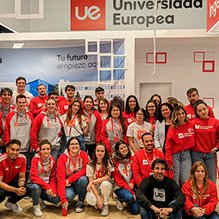
Come and see the campus
Get to know the facilities and discover why Universidad Europea is made for you.
Faculty
Percentage of lecturers with PhDs in the degree programme: 67%
Our teaching staff
- Javier Sánchez Sánchez
Head of the Physical Performance Area of the Technical Committee of Referees (CTA) of the Royal Spanish Football Federation. - José Luis Felipe Hernández
Head of Big Data and injury prevention at UD Las Palmas. - Nicolás de la Plata Caballero
Sports Policies. Head of Coordination at UFEDEMA- Centro de Enseñanzas Deportivas. - Álvaro Fernández Luna
Leader Researcher (IP) at Sport Management Universidad Europea Research Group. Leader of Research Projects with entities such as MutuaMadridOpen (MMO), Real Madrid Foundation, etc. - José Ramón Bonal Sánchez
Academic Coordinator for Global Sport Management Bachelor Degree. Venue Marketing Manager UEFA 2020. International Campus Experience Manager Real Madrid Foundation (2011-2019)
(Other professors)
- Tiziana Priede Bergamini
- Jairo León Quismondo
Collaborator at Spanish High Sports Council (Consejo Superiod de Deportes, CSD). International Research projects with Southern Connecticut State University (CT, USA). Young Researcher Award by Spanish Society for Sport Economics (SEED, 2019). - César San Juan Pajares
- Guillermo Miguel Rocafort Pérez
- Jorge López Fernández
- Guillermo Muñoz Andradas
- Joaquín Cerdá Béjar
- Carolina López Chaves
- Almudena Montalvo Pérez
- Alejandro Sánchez Varas
- Eva Asensio Castañeda
- Juan Antonio Simón Sanjurjo
- Jonathan Ospina Betancurt
- Alejandro Padilla Crespo
- Ricardo Macías Plá
Academic Coordinator for Sport Management Degree (Spanish & Online). Expert in golf market, golf academies and golf courses management - Silvia Burgos Postigo
- Rosa Bielsa Hierro
- María Garrido Muñoz
- Rocío Moldes Farelo
- Mª Victoria Gutiérrez Duarte
- Mª del Pilar Cerdera Jiménez
- Joaquín Sánchez Molina
- Javier del Arco Juan
- Enrique Gragera Pizarro
- Laura De la Calle Pérez
- Pablo Burillo
Senior Researcher in Sport Management at Universidad Europea de Madrid. Match Director at LaLiga. Leader of Research Projects with entities such as MutuaMadrid Open, Real Madrid Foundation, Spanish Basketball Federation, etc.
Excelencia avalada por los mejores
Frequently Asked Questions
What is a sports management degree?
It's the perfect combination between a business management and a sports degree. You will be able to learn aspects such as accounting, finance and strategic management combined with sports marketing, sport industry and sport events.
Why study sports management?
Organisations and entities of the sports ecosystem are growing every day, globally. Studying sports management will prepare you to contribute to such growth and impact the sport, fitness and physical activity industries. There are plenty of opportunities, so after developing your skills and knowledge you will be ready to transform your passion for sports into your job.
Where can I study a sports management degree?
Universidad Europea is the only Spanish centre that offers this degree, taught 100% in English, including corporate trips and experiences, and one year studying and completing internships in the USA.
What does a sport manager do?
A sports manager can do a variety of functions, from team management, strategic planning, financial control, to club management. Everything that a business manager could do but applied to sports.

